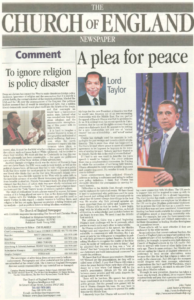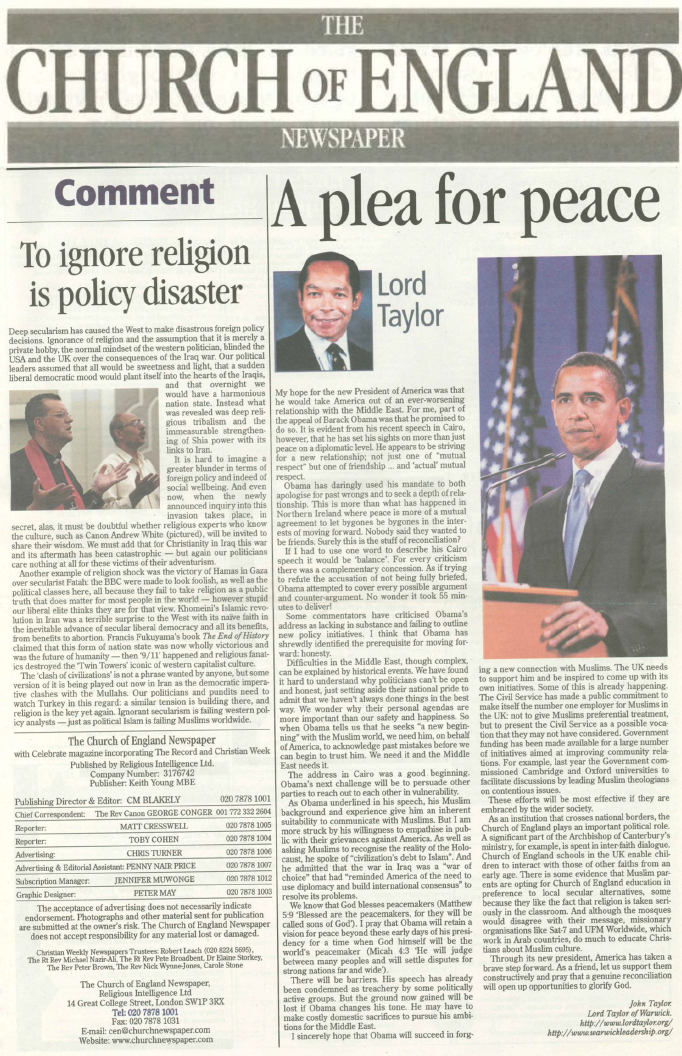Church of England Article By Lord Taylor of Warwick
 My hope for the new President of America was that he would take America out of an ever-worsening relationship with the Middle East. For me, part of the appeal of Barack Obama was that he promised to do so. It is evident from his recent speech in Cairo, however, that he has set his sights on more than just peace on a diplomatic level. He appears to be striving for a new relationship, not just one of “mutual respect” but one of friendship and ‘actual’ mutual respect.
My hope for the new President of America was that he would take America out of an ever-worsening relationship with the Middle East. For me, part of the appeal of Barack Obama was that he promised to do so. It is evident from his recent speech in Cairo, however, that he has set his sights on more than just peace on a diplomatic level. He appears to be striving for a new relationship, not just one of “mutual respect” but one of friendship and ‘actual’ mutual respect.
Obama has daringly used his mandate to both apologise for past wrongs and to seek a depth of relationship. This is more than what has happened in Northern Ireland where peace is more of a mutual agreement to let bygones be bygones in the interests of moving forward. Nobody said they wanted to be friends. Surely this is the stuff of reconciliation?
If I had to use one word to describe his Cairo speech it would be ‘balance‘. For every criticism there was a complimentary concession. As if trying to refute the accusation of not being fully briefed, Obama attempted to cover every possible argument and counter-argument. No wonder it took 55 minutes to deliver!
Some commentators have criticised Obama’s address as lacking in substance and failing to outline new policy initiatives. I think that Obama has shrewdly identified the prerequisite for moving forward: honesty.
Difficulties in the Middle East, though complex, can be explained by historical events. We have found it hard to understand why politicians can’t be open and honest, just setting aside their national pride to admit that we haven’t always done things in the best way. We wonder why their personal agendas are more important than our safety and happiness. So when Obama tells us that he seeks “a new beginning” with the Muslim world, we need him, on behalf of America, to acknowledge past mistakes before we can begin to trust him. We need it and the Middle East needs it.
The address in Cairo was a good beginning. Obama’s next challenge will be to persuade other parties to reach out to each other in vulnerability. As Obama underlined in his speech, his Muslim background and experience give him an inherent suitability to communicate with Muslims. But l am more struck by his willingness to empathise in public with their grievances against America. As well as asking Muslims to recognise the reality of the Holocaust, he spoke of “civilization’s debt to Islam“. And he admitted that the war in Iraq was a “war of choice” that had “reminded America of the need to use diplomacy and build international consensus” to resolve its problems.
We know that God blesses peacemakers (Matthew 5:9 ‘Blessed are the peacemakers, for they will be called sons of God’). I pray that Obama will retain a vision for peace beyond these early days of his presidency for a time when God himself will be the world’s peacemaker (Micah 4:3 ‘He will judge between many peoples and will settle disputes for strong nations far and wide’).
There will be barriers. His speech has already been condemned as treachery by some politically active groups. But the ground now gained will be lost if Obama changes his tone. He may have to make costly domestic sacrifices to pursue his ambitions for the Middle East.
I sincerely hope that Obama will succeed in forging a new connection with Muslims. The UK needs to support him and be inspired to come up with its own initiatives. Some of this is already happening. The Civil Service has made a public commitment to make itself the number one employer for Muslims in the UK: not to give Muslims preferential treatment, but to present the Civil Service as a possible vocation that they may not have considered. Government funding has been made available for a large number of initiatives aimed at improving community relations. For example, last year the Government commissioned Cambridge and Oxford universities to facilitate discussions by leading Muslim theologians on contentious issues.
These efforts will be most effective if they are embraced by the wider society.
As an institution that crosses national borders, the Church of England plays an important political role. A significant part of the Archbishop of Canterbury‘s ministry, for example, is spent in inter-faith dialogue. Church of England schools in the UK enable children to interact with those of other faiths from an early age. There is some evidence that Muslim parents are opting for Church of England education in preference to local secular alternatives, some because they like the fact that religion is taken seriously in the classroom. And although the mosques would disagree with their message, missionary organisations like Sat-7 and UFM Worldwide, which work in Arab countries, do much to educate Christians about Muslim culture.
Through its new president, America has taken a brave step forward. As a friend, let us support them constructively and pray that a genuine reconciliation will open up opportunities to glorify God.
